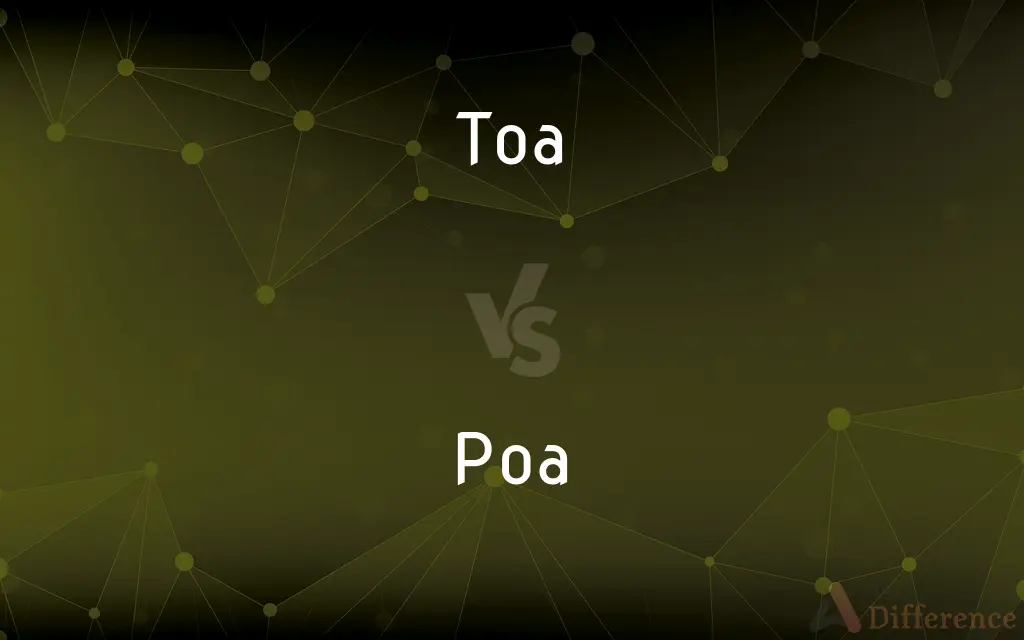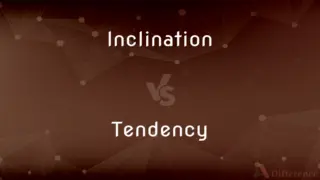Toa vs. Poa — What's the Difference?
By Tayyaba Rehman & Fiza Rafique — Updated on May 2, 2024
Toa are heroic characters in Bionicle lore, elemental warriors, while Poa, in Kiswahili, means "cool" or "okay."

Difference Between Toa and Poa
Table of Contents
ADVERTISEMENT
Key Differences
Toa refers to the biomechanical characters in the Bionicle universe, designed as heroes who protect their world from various threats, embodying elemental powers such as fire, water, and air. On the other hand, Poa is a common expression in Kiswahili, used to denote a state of being fine or satisfactory, and it is often used in casual conversation to express agreement or the acceptability of a situation.
While Toa are integral to the storytelling of the Bionicle series, each representing unique virtues and elemental forces, Poa serves as a linguistic tool that conveys a relaxed or positive attitude in East African cultures. This reflects the distinct nature of Toa as fictional elements in a narrative compared to Poa, which is embedded in real-world social interactions.
Toa are celebrated for their heroism and complex lore within their universe, forming a deep connection with their audience through detailed backstories and moral dilemmas. Conversely, Poa as a term is simplistic and broadly used, its utility lying in everyday communication without any narrative complexity.
The Toa's impact is mainly in the realm of entertainment and youth culture, specifically within the context of toys and media produced by LEGO. Whereas Poa plays a functional role in facilitating communication and expressing feelings or agreement in Swahili-speaking regions.
In terms of cultural significance, Toa resonate with themes of teamwork and justice, often explored through their adventures and challenges. Poa, by contrast, encapsulates a cultural ethos of harmony and ease, signifying a laid-back approach to life typical in Swahili culture.
ADVERTISEMENT
Comparison Chart
Definition
Biomechanical heroes in Bionicle lore.
Kiswahili term meaning "cool" or "okay".
Context
Fictional universe.
Everyday communication.
Usage
Narrative element in stories and toys.
Casual conversation.
Cultural Significance
Embodies virtues and elemental powers.
Reflects social harmony and agreeability.
Impact
Entertainment and moral storytelling.
Communication facilitation.
Compare with Definitions
Toa
Heroic figure.
Tahu, the Toa of Fire, fights to protect his land.
Poa
Relaxed.
Everyone was poa at the beach, enjoying the calm.
Toa
LEGO character.
Lewa, the Toa of Air, is popular among Bionicle toy collectors.
Poa
Cool.
The weather today is poa, not too hot nor too cold.
Toa
Elemental warrior.
Gali, the Toa of Water, uses her powers to control the seas.
Poa
Satisfactory.
The meal was poa; it met my expectations.
Toa
Mythic hero.
Kopaka, the Toa of Ice, embodies the virtue of wisdom.
Poa
Okay.
If you think we should leave now, then poa.
Toa
Protector.
Onua, the Toa of Earth, guards the underground secrets.
Poa
Agreeable.
His proposal was poa, so we accepted it.
Toa
A small painted artifact made by the Diyari people of Australia, believed to have been used as place markers or signposts.
Poa
Poa is a genus of about 500 species of grasses, native to the temperate regions of both hemispheres. Common names include meadow-grass (mainly in Europe and Asia), bluegrass (mainly in North America), tussock (some New Zealand species), and speargrass.
Toa
(New Zealand) A brave warrior.
Poa
Any grass of the genus Poa, especially Poa annua.
Toa
A Polynesian tree of the genus Casuarina, or its wood.
Poa
A genus of grasses, including a great number of species, as the kinds called meadow grass, Kentucky blue grass, June grass, and spear grass (which see).
Poa
Chiefly perennial grasses of cool temperate regions
Common Curiosities
What does Poa mean?
In Kiswahili, Poa means "cool" or "okay," used to express a state of satisfaction or agreement.
Can a Toa have multiple elemental powers?
Typically, each Toa is linked to one specific element, like fire or water.
Where is Poa commonly used?
Poa is commonly used in East Africa, particularly among Swahili-speaking populations.
Is Poa used in formal conversations?
Poa is generally used in informal settings.
How do Toa communicate their values?
Toa communicate their values through actions and stories that emphasize virtues like unity, duty, and destiny.
What is the significance of a Toa's mask?
A Toa's mask, or Kanohi, grants them special abilities and is a key aspect of their identity.
What is a Toa?
A Toa is a fictional heroic character in the Bionicle universe, often associated with a specific elemental power.
Does Poa have any synonyms in Swahili?
Similar terms to Poa include "sawa" (okay) and "nzuri" (good).
How are new Toa introduced in the Bionicle world?
New Toa are often introduced through transformative events in the narrative, such as discovering a Toa stone.
How does the meaning of Poa change with context?
Poa can shift from a simple acknowledgment to an expression of deep satisfaction, depending on context.
What challenges do Toa face?
Toa face challenges from evil beings and environmental hazards threatening their world.
What is the ultimate goal of a Toa?
The ultimate goal of a Toa is to maintain peace and balance in their universe, often through defeating malevolent forces.
Can Poa be used sarcastically?
Yes, like many informal terms, Poa can be used sarcastically in conversation.
Can Poa be used to describe feelings?
Yes, Poa can describe feelings of contentment or minimal satisfaction.
Are there female Toa?
Yes, there are female Toa, such as Gali, who is the Toa of Water.
Share Your Discovery

Previous Comparison
Inclination vs. Tendency
Next Comparison
Perspicacity vs. PerspicuityAuthor Spotlight
Written by
Tayyaba RehmanTayyaba Rehman is a distinguished writer, currently serving as a primary contributor to askdifference.com. As a researcher in semantics and etymology, Tayyaba's passion for the complexity of languages and their distinctions has found a perfect home on the platform. Tayyaba delves into the intricacies of language, distinguishing between commonly confused words and phrases, thereby providing clarity for readers worldwide.
Co-written by
Fiza RafiqueFiza Rafique is a skilled content writer at AskDifference.com, where she meticulously refines and enhances written pieces. Drawing from her vast editorial expertise, Fiza ensures clarity, accuracy, and precision in every article. Passionate about language, she continually seeks to elevate the quality of content for readers worldwide.
















































